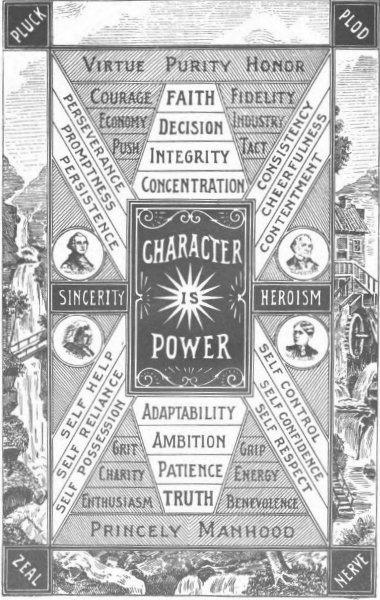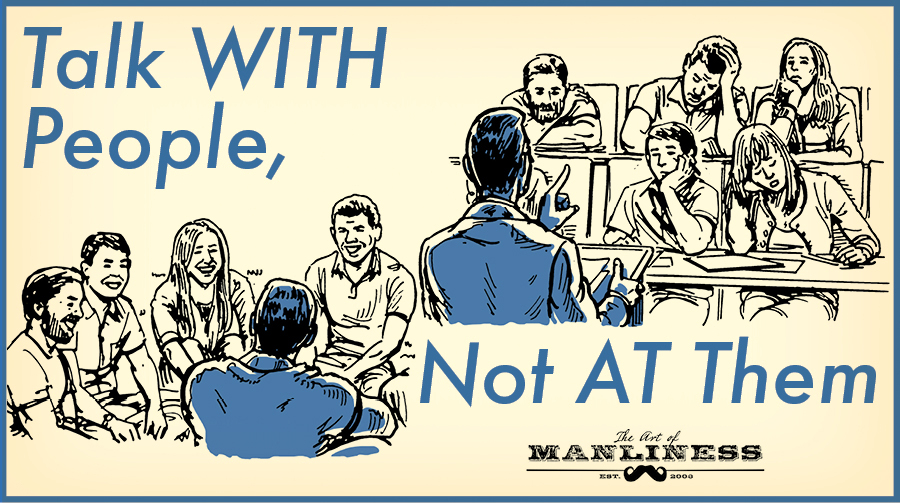You meet a woman at a party and think you have a good conversation. But when you later send her a text, she doesn’t respond.
You go into a job interview feeling confident and leave feeling like you aced it. But while you keep looking at your phone, expecting a callback, it never comes.
You meet a guy at a party you feel you have a lot in common with and could become a good friend. But at the end of the night, you don’t exchange information in order to get together again.
Have situations like these ever happened to you? From your end, you feel like the interaction went well, but it doesn’t seem like the other person felt the same connection. It’s confusing and frustrating.
Or maybe you actually rarely feel like your encounters with new people go well in the first place. You often feel awkward when meeting new folks, and thus aren’t particularly surprised when they aren’t interested in getting to know you better.
Either way, the issue may have to do with the first impression you give other people.
From cashiers, to other parents at school, to someone you say hello to at the gym, every day you’re making contact with people for the first time; it happens so often you may not even really register these encounters. But each interaction carries with it an opportunity and a possibility — every person you meet is a potential new friend, lover, or client.
Whether these possibilities turn into something more often hinges on the first impression you make — on whether you’re able to make a connection and inspire the new contact to want to get to know you better.
Do you know how you’d like to come off to others, how you really do, and how in-sync those two realities actually are?
You may not have ever thought too much about your first impression. Maybe you think changing yours would mean acting fake, or that judging someone at a glance is superficial and inaccurate anyway.
Yet none of those things are true.
Today we’ll clear up some common misconceptions about first impressions, and discuss why mastering the art of making a good one is not only crucial for romantic, professional, and social success, but can actually help you be more authentic with others.
The Indelible Importance of Your First Impression
Your whole life, you’ve heard that first impressions are important, and that you never get a second chance to make one.
But few probably realize just how true those adages are.
When you meet someone new, his or her brain forms an impression of you in just one-tenth of a second! Within 60 seconds, it’s processed as many as ten thousand visual, oral, and tactile cues as to who you are, what you’re like, and whether or not they’d like to get to know you better. These cues are weighed in the brain’s more primal, emotional centers, which instantly produce a visceral assessment — a gut feeling as to whether you’re a potential threat or asset.
This means that people have already decided on what you’re like before you’ve said anything beyond your initial introduction.
Not only are first impressions registered with lightning speed, but they last a surprisingly long time. Because of what’s called the “primacy effect,” people tend to lend more weight to the things they learn initially about someone, rather than the information they take in later. The initial impression you make forms a kind of filter or lens through which a new acquaintance will henceforth see you; moving forward, they’ll look for behaviors that confirm their conclusion, while largely ignoring things that contradict it. Once you’ve made an initial impression on the clay of their mind, the rest of the relationship tends to follow its contours, affecting all their future thoughts about you.
What this means is that a date or a job interviewer will probably decide whether or not they like you within minutes of your meeting, and then spend the rest of the date/interview simply confirming that decision.
Research has in fact found that it can take up to six months of regular contact with someone to change their initial impression and alter the lens through which they see you. That’s pretty dang sobering in and of itself. It’s even more sobering when you realize that beyond cases where you’re forced to interact again (e.g., in a workplace), those follow-up contacts won’t even have a chance to happen. It would be nice if everyone followed “The 3-Encouner Rule,” but in most cases, if you don’t make a connection with someone right off the bat, you’re not likely to get another opportunity to do so.
Indeed, in a time in which technology puts all the fish in the sea a mere swipe away, the fact that you never get a second chance to make a first impression has never been more true.
The Surprising Accuracy of First Impressions
It might seem unfair that people form such a firm assessment of you in such a short time, and think that these snap impressions are bound to be faulty.
Yet dozens of studies have shown that first impressions are actually highly accurate in gauging a person’s true personality and abilities. It turns out you can actually judge a book by its cover after all.
Some researchers theorize that our genetics may have evolved to broadcast our personalities on our faces. It also may be that in making certain expressions over and over again, they get rather etched into our visage. People with kind faces more often than not turn out to be kind; people with punchable faces, more often then not turn out to be obnoxious. Our moods and personalities are also invariably translated into our body language — how we stand, walk, gesture, and generally hold ourselves says a lot about who we are and what we’re like.
What this means is that first impressions aren’t so superficial after all, and that changing yours begins not with outwards behaviors, but inner values.
The Foundation of a First Impression Starts From Within
There is almost universal agreement among social researchers when it comes to the qualities people appreciate in new acquaintances, and are looking for when they take you in: people like other people who are warm, confident, trustworthy, credible, kind, and attractive, and who make them feel comfortable, interesting, and valued.
Basically, people like people who seem like they’ll be a social benefit, rather than a social burden. People are attracted to people who have something to offer — not just monetary resources, but those of many different kinds.
The authors of First Impressions explain that people are looking for those who come bearing 4 social gifts: appreciation, connection, elevation, and enlightenment. People who can make them feel understood and valuable and open their minds to new perspectives and information; who can make them feel good about themselves and will enrich their lives.
On the other hand, people tend to avoid those who are boring, empty, self-absorbed, insecure, and needy; people who will inflict a cost; who will require a greater energy investment than they give.
Maybe that seems cold, but what kinds of people are you drawn to? Those who seemingly will add to your life, and help move you closer to your goals, or those you intrinsically feel will suck the life out of you, and get you off track? People naturally look for alliances that will lend support and enrichment to their life’s journey.
It’s nearly impossible to fake in-demand qualities like warmth, knowledge, and honesty; some very charismatic people are able to do so, but usually the people they fooled will later say, “I could tell from the start there was something not right about him, but I ignored the feeling.”
It’s also very difficult to feign interest in people, if you haven’t developed a genuine curiosity about others. Fake confidence, too, can be seen a mile away.
Your personality creates a palpable aura around you; even if you don’t realize it, people can sense it as soon as you walk into a room.
So if you’re serious about improving the impression you make externally, you have to start by shaping your inner values. Work on your character. Expand your mind. Develop greater empathy. Gain confidence through mastery.
If you’ve ever been surprised at the transformation in a friend’s demeanor and visage from when he was in a really bad place in life, versus when he was in a really good place, you know what a difference changes to someone’s inside can make to their outside.
And how possible positive change is.
Listen to my podcast about the importance of your first impression:
Enhance the Potency and Accessibility of Your Best Qualities
Even though the foundation of a positive first impression lies within, that doesn’t mean external behaviors don’t also have a big influence on how you’re perceived by others. The outward “mechanics” of your first impression — what you say (conversation) and how you act (body language) — are also crucially important.
You might have good character and a warm personality, but you can act and converse in ways that create barriers to people accessing and appreciating these qualities.
Not only is the information people receive when they first meet you weighted more heavily than information they gather later, negative initial information is even more salient. Doing or saying just one thing that’s off-putting can outweigh a bunch of other positive behaviors, and create a less favorable impression that may take months to overcome (if you even get that opportunity).
And it’s not just purely negative things that can sink your first impression; there are also certain mannerisms and conversational approaches that, if not outright off-putting, aren’t ideal and don’t give your best qualities a chance to fully emerge and shine.
For example, you may be someone who feels that you’re open-minded and curious about people, but if you haven’t learned to ask others good questions, you won’t come across that way.
Or you may be a guy with a good heart, but if you don’t smile much, and tend to lean away from people with your arms crossed, folks won’t get the chance to discover your warm personality, and will instead think you’re more cold and aloof.
Mastering the mechanics of a positive first impression thus isn’t about hiding your true personality or trying to be someone you’re not. The goal of improving your conversational strategies and body language is simply to get these external behaviors to match and enhance, rather than contradict, your inner self. Doing so helps you reveal and showcase your best qualities, and gives others greater access to them.
Such packaging may only be skin deep, but it draws people in and entices them to want to “unwrap” you further.
Conclusion
Even though caring about your first impression is often seen as superficial, or something that leads you to act like someone you’re not, hopefully you’ve come to see its true significance and importance. First impressions are not only made quickly, hard to shake, and highly accurate, but they’re largely based off who you really are.
Working on your first impression then doesn’t mean being fake, but first improving your inner “game,” and then learning how to present your true self in the best possible light — how to get out of your own way in order to lead with a sample of yourself that’s in fact more accurate than when you behave in ways that belie your real feelings and values.
What’s so satisfying about mastering the art of first impressions is that it puts you in control of your interactions — it allows you to be perceived as you’d like to be. You’ll have the power to change how people react to you, and get more pleasure from your day-to-day interactions.
That doesn’t mean you can completely control the outcome of these encounters. Even when you make a positive first impression, sometimes you’re just not compatible with another person. And that’s okay. You’re not for everyone, and neither is anyone else. But when you know you gave your very best impression, and accurately conveyed your personality, you won’t have to worry if a failed connection was a matter of compatibility or if you simply didn’t come off well. You won’t have to ask what if. You’ll have the assurance that you and the other person just aren’t suited to each other.
Now that you’ve come to understand why a first impression is so important, you’re probably wondering what makes for a good one. Well you’re in luck, because next week we’ll offer a practical primer on its most important element.
Stay tuned.
__________________
Sources:
First Impressions by Ann Demarais and Valerie White
Snap: Making the Most of First Impressions, Body Language, and Charisma by Patti Wood








